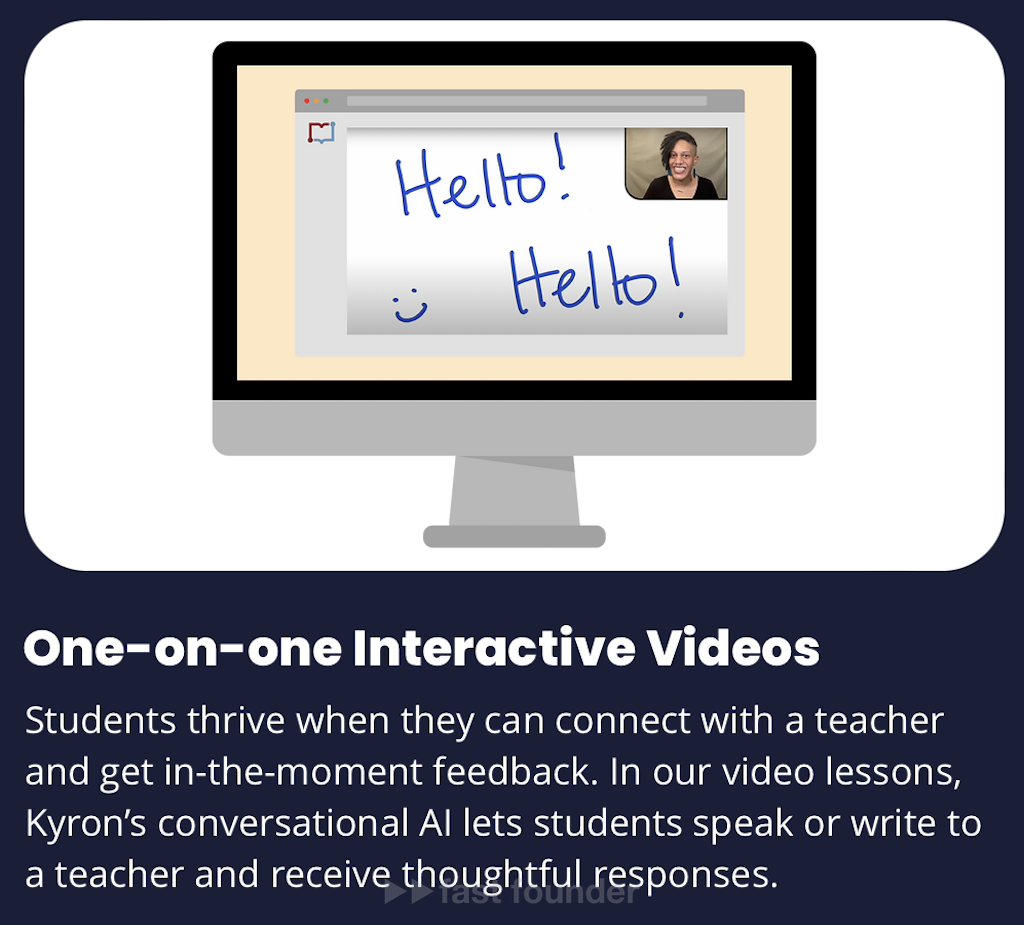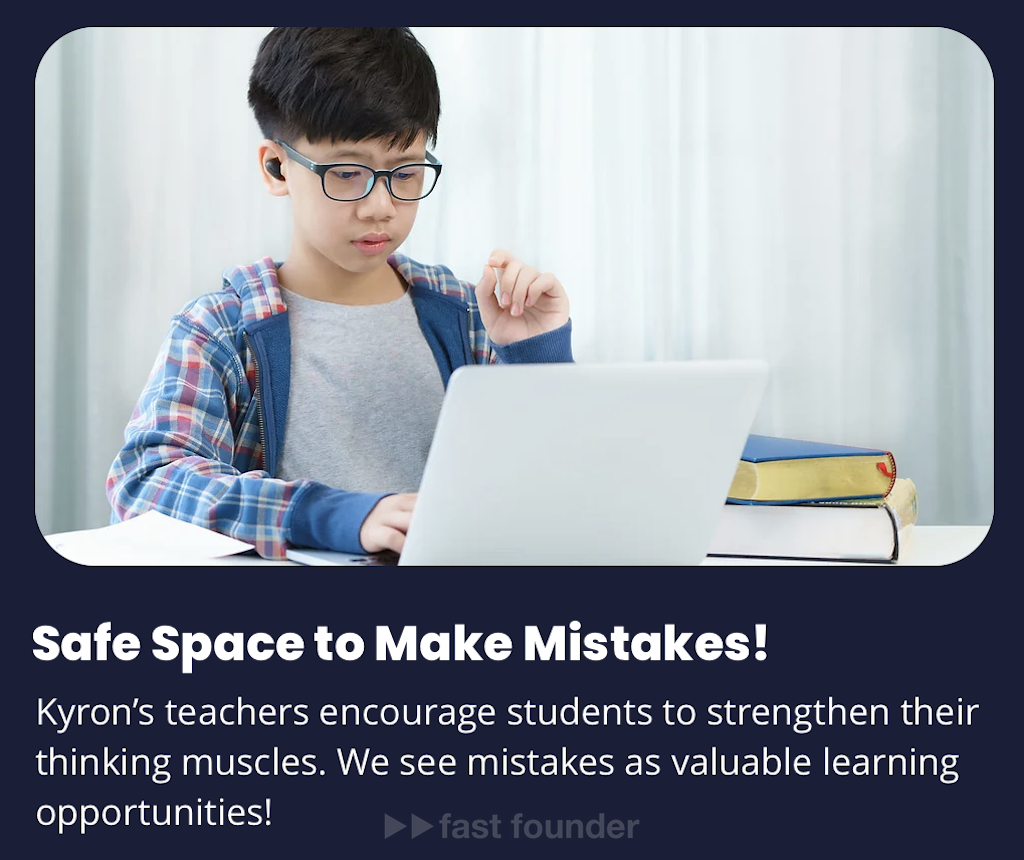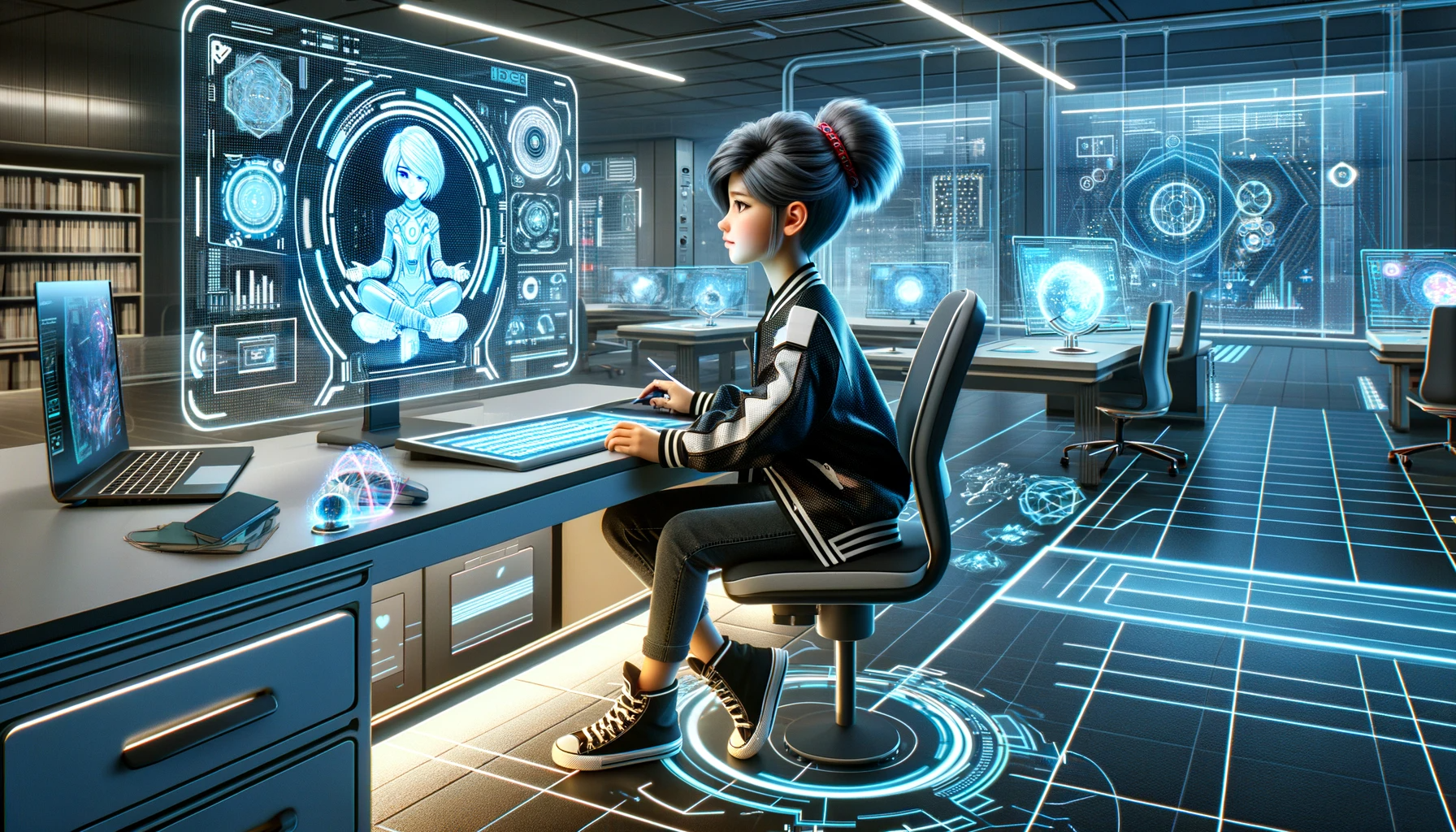“Online education will always be a huge market. But creating yet another set of educational courses is pointless, as there’s already plenty of that on the internet 😉 However, such lessons can be unique! This startup created a platform with lessons that are not meant to explain the material but to identify and correct mistakes made in its study. It’s an excellent approach, applicable to teaching anything.
The Essence of the Project

Kyron Learning is an educational platform with pre-recorded video lessons for schoolchildren. However, a conversational AI magically transforms these pre-recorded video lessons into an interactive tool, significantly enhancing the quality of school education.
This platform is typically used by school teachers as an additional educational tool. A teacher can send a student a link to a lesson on a topic where they did not show sufficient knowledge in class or in homework.
The lessons on the platform are recorded by experienced teachers whose approach can help a student understand the topic, even if the school teacher failed to do so.
At the beginning of each lesson, the teacher introduces themselves, states the educational goal of the lesson, and explains how the acquired knowledge can be applied in real life.

After that, the student’s familiarity with the topic is checked – they are given questions to answer verbally. The platform’s AI analyzes the responses and based on that, assembles the lesson structure from pre-recorded teacher segments explaining the material – thus the lesson is “on the fly” adjusted for the specific student.

Each lesson consists of a sequence of segments explaining a concept or notion. After explaining each segment within the lesson, the student is asked questions, the responses to which are analyzed by the AI.
If all responses are correct, the lesson continues with the explanation of the next segment of material. If an incorrect answer is given to any question, the student is shown a segment with a more detailed explanation of the same material – after which they are asked the verification questions again. If the responses are correct, the student moves on. If not, they are shown another more detailed explanation. And so on.

At the end of the lesson, the student is shown a segment with a brief summary of the material covered, and the AI congratulates the student on successfully learning the topic, tailoring the congratulatory wording to the student’s specific lesson progression – like “this particular question posed a difficulty for you, but you successfully overcame it”.
Information about successful lesson completion, along with a list of questions that posed difficulties for the student, is sent to the student’s school teacher – so that they can accordingly adjust the plan for further individual work with the student.
The startup was founded last year. Last fall, it attracted its first $5.5 million in investments. And now it has raised a new round – already at $14.6 million.
What’s Interesting

The startup touts the individuality and interactivity of lessons as its main advantage. However, assembling a sequence of explanations of educational material based on student responses is not a big trick. It could even be done without AI that analyzes the student’s verbal response and extracts the meaning of the response – it could just as successfully select the answer option with a mouse click on the screen.
The real trick is actually something else!

The teacher’s expertise lies not only in learning to explain the material well but in knowing in advance which points usually cause difficulties for the student. And what’s even more important – they know what incorrect assumptions, formed or emerging in the student’s mind, can lead to these difficulties.
Thus, they already know the connection between the wrong answer to a question and the wrong assumption in the student’s mind that caused that specific wrong answer. Therefore, they can pre-record segments of material dispelling wrong assumptions – and then the specific segment dispelling a particular wrong assumption will be shown to the student upon receiving a specific wrong answer to a specific question.
Unfortunately, most teachers, when faced with a student’s misunderstanding, just try to repeat the same explanation in different words – hoping that the student will eventually understand it. This can only happen by chance. Because the real problem usually isn’t that the student doesn’t understand the teacher’s words. It’s that there’s some internal reason in their head preventing them from grasping their essence. Frankly, it’s pointless to try to explain to a student why geometry, in which parallel lines intersect, has a right to exist if they are convinced that the Earth is flat 😉
Once I read a book by a math teacher who only realized this nonsense after 20 years of practice. And after that, 90% of the time spent creating tests to check knowledge of the material went into creating variants of incorrect answers. Because incorrect options can’t just be slapped together on the principle of “just to be wrong.” Each of them should correspond to some conceptual problem in understanding the essence – so that with the help of this variant of the answer, it could first be identified and then quickly corrected.

It seems that Kyron Learning builds the educational process on its platform precisely on this principle. They say that their platform is a place where making mistakes is safe. And every mistake is not a failure but an opportunity to learn something. Because only after making a mistake can a teacher understand exactly what the student needs to be taught 😉
Where to Run
The main takeaway is that it’s time to stop reducing education to a process of knowledge transfer. This has become particularly relevant now – when a multitude of explanatory lessons on any topic to suit any taste and color can be easily found on the internet. Or just ask ChatGPT to explain a concept to you.
Yet online education will remain a huge market. Only on it, we need to stop churning out yet another course with yet another set of explanations of the subject from yet another talking head.
It’s better to focus on more substantial aspects of the educational process, helping students learn material faster and more effectively, perhaps even studied elsewhere. This is the most relevant direction for potential movement into the online education market at the moment.
Today’s Kyron Learning, for example, can be simplified as a catalog of common mistakes and their explanations, which can be used as an additional tool in school education.

Sizzle is an app that helps schoolchildren and students do their homework. The app doesn’t give ready answers to problems. The trick is that the service’s AI machine suggests steps with which the student can solve the problem independently – and therefore it is also an additional tool for learning. This startup raised $7.5 million in investments in its first round.

Gizmo uses AI to automatically create flashcards for revising and memorizing material studied at school, university, courses, or independently. You can upload the text of a lesson or lecture to the platform – and the AI machine will generate a set of flashcards on the key concepts of the uploaded educational material and will offer them to the user with the frequency necessary for effective memorization. This startup raised $3.5 million in investments and also in the first round.
What aspect of learning is best to automate and turn into a service? For this, it’s best to rely on your own experience. What have you recently learned or are learning now? What moments in learning cause difficulties? What are you missing to overcome these difficulties? How can you adapt AI to help you deal with them?
It’s really interesting – what exactly are you struggling with, and what AI use cases would you suggest as a remedy for their treatment?
About the Company
Kyron
Learning Website: kyronlearning.com
Last Round: $14.6M, November 13, 2023
Total Investments: $20.1M, Rounds: 2
